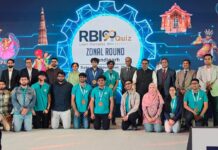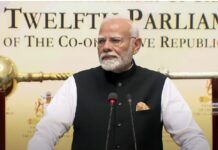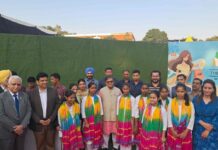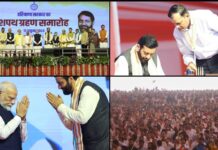PGI Chandigarh invites leading editors, journalists
to share their experience of working during COVID19 pandemic
Department of Community Medicine and School of Public Health Department of Community Medicine and School of Public Health, PGIMER, Chandigarh organized a webinar on “Health Journalism in the times of COVID” in collaboration with Strategic Institute for Public Health Education and Research (SIPHER) and Global Health Advocacy Incubator (GHAI). The webinar was aimed at training media professionals, aspiring journalists, public health professionals and researchers to understand key requirements to write effective and efficient news articles. Editors and journalists from leading newspapers took part in the event to deliberate on the importance of effective media communication.
Dr Sonu Goel, Professor, in Department of Community Medicine and School of Public Health, PGI Chandigarh underscored the need of such programs for writing effective media stories, news articles in print and audio-visual media. He reiterated the fact that media is a bridge between public health professions and community for disseminate reliable and factual information and vouched for an ethical and human approach by media while reporting sensitive news.
Ms Naina Mishra, Staff Correspondent, Tribune, Chandigarh; Mr Satender Chauhan, Deputy Editor, Aaj Tak; Ms. Lopa Ghosh, Country Coordinator, Global Health Advocacy Incubator (GHAI); Mr. Saurabh Duggal, Senior Journalist, Hindustan Times; Mr AS Prashar, Senior journalist, Punjab Express News; Ms Dinkle Popli, Web Journalist, Dainik Savera Times; and Mr Umesh Sharma, Senior Correspondent, News18 virtually joined the event.; Dr Rakesh Gupta, President and Director Public Health, SIPHER; and Mr Arun Verma, Director, Finance and Operations, SIPHER moderated the different sessions.
Briefing the participants on “How to write an effective media story – What a journalist wants?” Ms Naina Mishra said, “It’s a journalist’s duty to clearly and responsibly communicate reliable information to the general public. During a global health crisis, like the one we face now with the spread of COVID-19, this role becomes ever more critical”.
Mr Satender Chauhan, Deputy Editor, Aaj Tak shared his experience regarding the role of electronic media during COVID. He explained, “Unlike print journalism, the electronic media doesn’t have an entire day to publish a story. The time is limited and reporters have to make sure that they present an unbiased opinion to masses”. He further spoke at length on a number of challenges faced by journalists while working in the field.
“Media has the power to influence our lives in a number of ways – ranging from awareness generation, framing social norms, creating informed citizens and performing its role as a watchdog or conscience keeper. When the pandemic broke out, media fulfilled all of these functions. I hope going forward media will accord equal attention to the crisis of non-communicable diseases as well,” Ms Lopa Ghosh, Country Coordinator, Global Health Advocacy Incubator (GHAI).
“The pandemic has deprived treatment to millions of people suffering a heart attack, stroke or undergoing treatment for cancer. It is critically important for the media to keep talking about prevention of and treatment for these chronic illnesses. A panel discussion was also conducted through the end of the webinar in which journalists highlighted the challenges and opportunities while working in the times of the pandemic,” she added.
A panel discussion was also conducted through the end of the webinar in which journalists highlighted the challenges and opportunities while working in the times of the pandemic.
Mr AS Prashar, Senior journalist, Punjab Express News, said, “The key responsibility of any journalist is to write stories, which are not factually wrong. It is quite evident that we have entered into the times when journalists have to be more aware in order to inform readers and not create panic among them”.
Mr. Saurabh Duggal, Senior Journalist, Hindustan Times, said, “Media plays a major role as health advocates and change agents. In the past, there have been instances when Indian media houses have led movements of change in India”. He further highlighted the need of quality research and even gathering information while working on critical stories.
Mr Umesh Sharma, Senior Correspondent, News18 shared his experience of reporting in the times of pandemic. He urged the participants not to attach stigma with the people, who have survived the pandemic.
Ms Dinkle Popli, Web Journalist, Dainik Savera Times, explained the importance of writing a balanced news story and briefed the aspiring journalists on writing an eye-catching news article.
The participants from various parts of the country asked several questions during the webinar which were addressed by the media personnel.
















